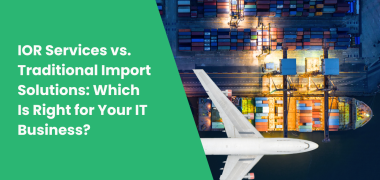In today’s globalized world, information technology (IT) businesses frequently face the challenge of navigating complex international trade and compliance regulations. For companies that are importing IT equipment, like servers, routers, and other high-value electronics, choosing the right import solution can make or break their expansion into new markets. Two primary options present themselves to IT businesses: IOR (Importer of Record) services and traditional import solutions. But which is the best choice? This guide explores each solution, the benefits, and the potential pitfalls, helping IT businesses make an informed decision.
Understanding IOR Services
IOR Services provide a dedicated, streamlined solution for handling the legal and regulatory responsibilities of importing goods into a foreign country. Acting as the legally recognized importer, an IOR service provider manages critical aspects like customs clearance, taxes, and compliance with local regulations, eliminating the need for the client to establish a physical presence or legal entity in each import country.
Key Features of IOR Services:
- Legal Importer Role: The IOR provider assumes the role of the legal importer, taking on liability for compliance with local laws.
- Customs Clearance Management: They handle customs duties, tariffs, and the necessary documentation.
- Compliance with Regulatory Standards: An IOR ensures the products meet all regulations, such as certifications, labeling, and documentation requirements, specific to each country.
- Efficient Operations: IOR services are streamlined for global operations, allowing businesses to ship to multiple countries with minimal hassle.
IOR is particularly suited for businesses without local entities in their target countries and those looking for a simple, compliant way to enter new markets with minimal setup time and costs.
Traditional Import Solutions Explained
Traditional Import Solutions typically involve handling import processes internally or through a local distributor. This approach demands that the importing business maintain a physical or legal presence in the target country to navigate local customs processes directly. Importers are responsible for ensuring compliance with customs regulations, managing duties and taxes, and obtaining necessary permits.
Key Features of Traditional Import Solutions:
- Direct Management: The business itself, or a local representative, directly manages customs clearance and compliance.
- In-House or Partner-Led Compliance: Importing companies either have dedicated compliance teams or partner with local distributors who can oversee regulatory adherence.
- Control Over Import Processes: Traditional import solutions offer more control over every step, allowing for custom solutions that fit specific business needs.
- Extended Setup and Legal Costs: Due to the need for physical or legal presence, companies incur additional costs and face time-intensive procedures to establish operations in each country.
Traditional import solutions are ideal for businesses with established entities or trusted partnerships in target markets. These companies often have the resources to invest in dedicated import teams or the legal infrastructure required for large-scale, long-term import operations.
Comparing IOR Services and Traditional Import Solutions
When deciding between IOR services and traditional import solutions, IT businesses need to consider several key factors: compliance, cost, flexibility, risk management, and scalability. Let’s delve into how these factors play out for each option.
1. Compliance and Regulatory Risks
IOR Services:
IOR providers specialize in navigating complex regulatory landscapes across multiple countries. They are experts in local customs regulations, required certifications, and country-specific compliance laws for IT hardware. For IT businesses, this means they don’t need to understand or continually update their knowledge of each market’s regulations.
Traditional Import Solutions:
When using a traditional approach, businesses must stay up-to-date with changing customs and regulatory requirements in every market they operate in. Non-compliance risks can lead to costly fines, shipment delays, or even product bans. However, in some cases, an in-house team may provide a higher degree of tailored oversight in very niche or regulatory-heavy markets, though this demands considerable investment.
Winner: IOR Services
IOR services typically offer superior compliance support due to their expertise and streamlined processes, making them advantageous for companies entering multiple new markets.
2. Cost Implications
IOR Services:
One of the primary benefits of IOR services is the predictability of costs. The IOR provider includes various fees (such as duties, taxes, and compliance costs) in its service package, allowing businesses to forecast expenses with greater accuracy. By eliminating the need for a physical presence, an IOR service can significantly reduce overhead expenses.
Traditional Import Solutions:
The costs associated with traditional import solutions can vary widely and are often unpredictable. Businesses must account for the expense of establishing a legal entity, managing customs fees, hiring a local compliance team, and absorbing potential penalties due to non-compliance. For large-scale, long-term projects, however, traditional solutions can provide some cost efficiencies if a company can leverage volume discounts or streamline operations.
Winner: IOR Services (for small and mid-sized companies)
IOR services generally offer a more affordable, predictable option for smaller or expanding businesses, while traditional import solutions might be cost-effective for larger companies with existing resources and infrastructure.
3. Flexibility and Speed to Market
IOR Services:
With an IOR provider, companies can bypass the long setup periods associated with traditional import methods. IOR services are designed for quick entry into new markets, allowing businesses to ship products globally without establishing entities or forging local partnerships. This is crucial for IT businesses that need to deploy equipment quickly or operate in high-demand markets with minimal lead time.
Traditional Import Solutions:
Traditional methods often require considerable setup time due to legal requirements, local hiring, and partnership negotiations. Once established, though, a traditional setup can provide a tailored approach, potentially beneficial for businesses with highly specific import needs. However, the initial delays and complexities make traditional methods less suited to businesses seeking rapid expansion.
Winner: IOR Services
For businesses looking for speed and flexibility, IOR services present a more streamlined and efficient solution.
4. Risk Management and Liability
IOR Services:
A significant advantage of IOR services is the liability they assume. The IOR provider takes on risks associated with compliance and customs issues, sparing the client from potential penalties or legal issues. This feature alone can be a compelling reason to choose IOR services, particularly for IT businesses with high-value products.
Traditional Import Solutions:
When using a traditional approach, the importing business retains most, if not all, liability for compliance breaches, customs errors, and potential penalties. This increased liability means companies need to implement strict oversight mechanisms, adding to operational complexity and potentially increasing costs.
Winner: IOR Services
IOR services offer superior risk management, allowing companies to focus on core business activities rather than regulatory challenges.
5. Scalability for Growing Businesses
IOR Services:
IOR services are inherently scalable, as they allow IT businesses to enter new markets with minimal additional investment or infrastructure. This scalability is especially valuable for companies experiencing rapid growth or expanding into multiple international markets simultaneously. IOR providers typically offer solutions that can be customized to fit a company’s growth trajectory.
Traditional Import Solutions:
For larger, well-established IT companies, traditional import solutions can be scaled effectively if resources are available. However, scaling through traditional import solutions often demands significant investment and internal resources, such as expanded compliance teams or additional legal representation in new markets.
Winner: IOR Services
IOR services are generally more scalable for IT businesses looking for fast, efficient market entry and expansion.
Practical Scenarios: When to Choose Each Option
IOR Services Are Ideal When:
- You’re expanding into a new region with limited knowledge of local customs regulations.
- The business model is highly agile and growth-focused, needing quick entry into multiple markets.
- The company lacks local infrastructure or resources to manage imports in each target country.
- Compliance is a significant concern, and managing regulatory risks without dedicated local teams is preferred.
Traditional Import Solutions Are Better When:
- Your business has an established local entity or trusted distributor that can handle compliance.
- Operations are focused in a single market or a few key regions, allowing for cost savings on a per-unit basis.
- You have the resources and expertise to manage compliance and logistics internally, potentially optimizing costs over the long term.
- The imported goods require a high degree of customization in handling, storage, or distribution, which may be challenging to manage through an IOR provider.
Conclusion: Choosing the Right Solution for Your IT Business
In the battle between IOR services and traditional import solutions, there is no one-size-fits-all answer. IOR services offer a practical, risk-managed, and highly scalable solution, particularly well-suited for IT companies seeking fast, compliant, and low-overhead market entry. For most small to mid-sized IT businesses, the predictability, lower risk, and scalability of IOR services make them an attractive choice.
Traditional import solutions can be effective for businesses with extensive infrastructure or established local partnerships in target markets. Companies that prefer a hands-on approach and have the resources to manage the complexities of compliance may find that traditional solutions offer more control, especially in large, stable markets.
When deciding, IT companies should weigh their goals, resources, and risk tolerance. By carefully evaluating these aspects, businesses can make informed decisions that align with their growth strategy and operational needs. Whether opting for an IOR service or a traditional approach, selecting the right import solution is a crucial step toward successful global expansion.




